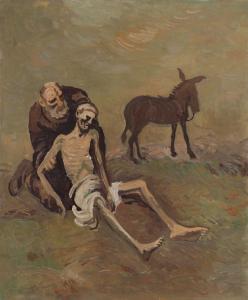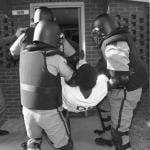
“But wanting to justify himself, he asked Jesus, ‘And who is my neighbor?'” (Luke 10:29)
When I first arrived at Washington National Cathedral twenty-five years ago, the Cathedral gave me three things. Two prayer books, one black, one red. And a Day Planner. The Day Planner was larger than the prayer book and that should have told me something.
But the psychology behind Day Planners was revealing. For those of you not old enough to remember the horse and buggy age, before the cell phone, Day Planners were the dominant tool for organizing life. They were made of paper, they had custom-made binders; and they dedicated two pages to every day of the year.
Checked Them Off
In addition to a daily calendar, it also provided a column for your to-do list; and along with that to-do list, you were provided a series of symbols for tracking your progress. “X” — which was very rare — indicated a task had been deleted. A dot indicated that you had begun working on the task. And the coveted checkmark indicated that a task had been completed. The dirty, emotional secret about Day Planners is that if you worked on something you forgot to put on your list, you wrote them down anyway, just for a sense of satisfaction or control and checked them off.
The desire to quantify what we need to do extends to the spiritual life, as well.In many ways, in fact, the spiritual and the day-to-day demands of life are intertwined. What we do on a daily basis is often tied to our sense of place, purpose, and value. And the spiritual goals that shape our lives are rarely very deep, if they don’t find expression in at least some of our daily choices.
Who is My Neighbor
The problem is that far too many of us, at one point or another in our lives, really have believed that God has a list of things we need to do to deserve his love. A list of things that God expects us to fulfill if we want to avoid judgment. And a list of things to do that will prove our worth.
What we might call “the sin of quantification” is everywhere we look. In the way in which we describe God, our relationship with God, and the nature of life itself.
Though he is also setting a trap for Jesus, the lawyer’s question is born of that impulse. “Who is my neighbor?” Tell me that, and I can get a list of the relevant people. I can eliminate others. And I can discharge my responsibility.
How can I be a neighbor?
Instead of answering his question, Jesus tells him the story of the Good Samaritan. And the “hero” in the story, the one who gets it right, is not the one that Jewish tradition thought of as “righteous” — not the priest, not the Levite – but the “half-breed” with the questionable theological pedigree.
Now, some modern interpreters conclude that what Jesus is doing is lionizing the outsider. So, they argue that what Jesus is doing is celebrating person whose is theologically liberal but caring. But this is a completely modern reading of the passage.
The point that Jesus is really making is that the lawyer is asking the wrong question. The question isn’t “Who is my neighbor?” The story of the good Samaritan doesn’t provide a list of neighbors.
The question is “How can I be a neighbor?” And the story centers on somone who knows how to be one.
Who You Are That Counts
This approach to the spiritual life points to a message in the teaching of Jesus that we lose track of — over and over again. Jesus is in the business of healing and transforming our relationship with God and with one another. He invites us to participate in his life, to become more like him. And, as we become more like him, he invites us to let that relationship transform the way that way that we care for one another, the way that we are with one another.
Lists can never get us there. We can do loving things but that doesn’t mean that we are loving. We can love some people but reveal just how unloving we are by excluding others. Or we can love people for all the wrong reasons — in order to manipulate them or use them, instead of loving them for their own sake. Time and time again, it turns out that what is important is not what you do, but who you are that counts.
Over the last week in Texas we have seen people who aren’t listing their neighbors but are choosing to be neighbors:
Cajun Navy
The 300 Justice Road Crew is a group of guys who went to college in Nacogdoches at Stepen F. Austin State. It was originally a cookoff team that got their start both eating and drinking more than they should. But – by their own admission – they got a little smarter — and directed their attention to relief work.
They are in the Texas Hill Country and one their leaders, Brooks Holzhausen from San Antonio, has been limping through the terrain just six weeks after Achilles tendon surgery. Holzhausen told a reporter:
“My wife thinks I’m crazy, but my family understands the mission,” … “They know that if things had played out a little differently, we could be here looking for either one of my girls instead.”
The “Cajun Navy” – a volunteer relief and rescue crew from Louisiana, went to the Texas Hill Country to find people who were caught up in the flood there. They have no particular connection to the people there. Given the fact that it was the July 4 weekend, one of the challenges has been that local officials are not even sure who was there.
But the Cajuns gathered their gear and traveled several hundred miles to spend the last week working alongside other first responders, picking through the water, mud, and debry to find the living and the dead. And when the first shift was replaced by a second shift, many of Cajuns complained that of all the hard things that they did this last week, the hardest thing that they did was pack up to return home.
Mexican Samaritans
And, then, there is the team from Mexico that happened to be in Texas with a team of cadaver dogs that was getting training for their dogs, that decided to swing into action on behalf of the victims and have been working there ever since.
These stories, of course, are pictures of public efforts that not all of us have the opportunity to make. We may not be physically capable of doing the work that they are doing. We may not be appropriately trained. We might just be in the way.
But, if, instead of asking, what’s my list? If, instead, you think of yourself as an agent of the healing that Jesus offers to the world, then you will find a place to be a Good Samaritan.
Good Samaritans don’t have a list
You will find someone who is hurting, who needs to know that they have a friend. You will find someone who is feeling unloved, who needs to know that there is someone who does love them. You will find someone who feels that life has beaten the hell out of them, who needs to know there are people out there who know what that’s like and still find joy and purpose.
So, the details of the stories I have shared are not the point. The point of these stories of modern Good Samaritans is this and it was the point of the story that Jesus told:
Good Samaritans don’t have a list.
Good Samaritans aren’t always in the best position to show compassion.
Good Samaritans may not be as strong or as well prepared as they might like.
They may not feel that they have that much to offer.
But Good Samaritans looks for neighbors.
They are neighbors.
And when they have done everything that they can do, they find it hard to pack up.
This is the kind of people we are called to be.
God of Compassion and love, teach us to be Good Samaritans. Bearers of your healing and love, touching and transforming our lives, drawing us closer to you and – in drawing closer to you – drawing closer to one another. Thanks to your mercy, we have the capacity to lift one another, encourage and comfort one another. Prompt us to be the agents of that mercy, bearers of your Son’s redeeming love. In whose name we pray. Amen.











